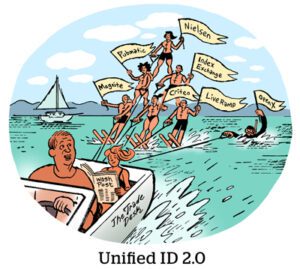NBCUniversal highlighted three streaming-oriented companies it is considering – Conviva, Dumbstruck and Truthset – to create a framework for alternative currencies as it prepares to move away from legacy TV ratings giant Nielsen as the industry’s single currency provider.
Kelly Abcarian, NBCU’s EVP of ad measurement and impact, again called for “measurement independence” and for the industry to move away from relying solely on Nielsen at the Advertising Research Foundation’s Audience X Science event on Monday.
Though she didn’t specifically call out Nielsen, Abcarian gave a keynote speech challenging the industry to focus on opportunities with multiple measurement providers who use advanced data and analytics, saying that the traditional panel-based surveys the measurement giant is known for are not equipped for connected TV.
“Measurement independence won’t happen overnight, especially if our industry continues to focus on our collective deficits, rather than our collective opportunity,” Abcarian said. “Part of the problem is that we all spend way too much time … focused on addressing the current system’s failures.”
Last month, NBCU issued an RFP to more than 50 measurement companies – including Comscore, Nielsen, VideoAmp and iSpot – to advance measurement alternatives that can provide a unified look at viewership across streaming, mobile, desktop and linear. NBCU said it’s reviewing more than 80 responses.
Conviva, Dumbstruck and Truthset were among the respondents and cited as examples of companies NBCU is evaluating that could address three core challenges around measurement in CTV: knowing who consumers are, understanding their behavior and emotions, and helping marketers drive ROI, “because most third-party consumer data is up to 50% inaccurate.”
“We’re still making CTV deals based on downright misleading information – and bad data means bad deals for both buyers and sellers alike,” Abcarian said. “Our single legacy yardstick just can’t handle sophisticated technology like CTV, or its equally sophisticated consumer. And we focused on ad delivery, while the viewing experience has suffered.”
Streaming analytics company Conviva, for example, deploys four billion “video sensors” across 500 million unique viewers watching 200 billion streams per year. It tracks diverse consumer behavior by placing a sensor in publishers’ and programmers’ videos or streaming content, and centralizes the data.
Conviva also claims to improve the viewing experience for both content and ads – such as rebuffering issues – and can serve contextual ads.
“What if we could take this technology and expand it, taking that sensor inside of the consumer streaming experience and be able to truly count it all?” Abcarian said. “Imagine the ability to know … the actual reach of those consumers, and more importantly, how many times that ad has been seen by the consumer. And not just for us at NBCU, but for any one stream that consumer is watching.”
Dumbstruck, meanwhile, uses AI to analyze video content and gauge the emotional response of viewers. Via a device’s opted-in camera, it uses facial recognition technology to interpret expressions and eye movements. The tech helps marketers get feedback to improve their creative.
“This same approach could also be used at NBCU to help us understand the emotional impact our content has, and its effect on subsequent ad breaks,” Abcarian said. “There’s a physical experience on our devices. And then there’s the emotional experience of our content. If we’re going to improve measurement, we need both.”
Additionally, ad tech startup Truthset can help marketers optimize campaigns “on the fly” by measuring performance to ensure the right audiences were reached. Its tech validates consumer data from 15 large third-party data providers, as well as its own independent data set, to vet the accuracy of a particular demographic attribute.
“Marketers simply don’t know who has the most accurate consumer data, and we collectively need to fix that,” she said.
NBCU will not be selecting one provider, but plans to tap multiple companies after it wraps its RFP process next month, a spokesperson told AdExchanger.
NBCU will share the responses and insights it receives – even for companies that it doesn’t select – with industry organizations such as the Association of National Advertisers, the 4A’s, the Video Advertising Bureau and the IAB to create awareness about available measurement options.
NBCU also created a Measurement Innovation Forum to develop new measurement solutions. To date, all the media holding companies, as well as a growing list of trade bodies and brands, are participating. The network is also working with the VAB as part of its Measurement Innovation Task Force.
Industry organizations have been playing a key role in organizing against Nielsen. The Video Advertising Bureau, with a membership of TV networks, urged The Media Rating Council (MRC) to audit Nielsen. Last month, the MRC stripped Nielsen of its National and Local TV ratings accreditation after the measurement giant underreported viewers during the pandemic. On Monday, the Association of National Advertisers voiced its support for the MRC and the need for a cross-media measurement solution that meets MRC accreditation standards.
Jo Kinsella, president of ad measurement company TVSquared, lauded NBCU on Monday during a separate event that was part of the VAB’s Attribution and Outcomes Week. The industry’s “measurement yardstick” needs to change, she said.
“I don’t think we’re going to replace Nielsen with one company,” Kinsella predicted. “I think it’s going to be a mixture of currencies based on measurement, outcomes, audiences, verification services and yield optimization. And I think it’s going to come down to collaboration and being open and transparent.”
Over the short term, traditional buying in the upfronts will face greater scrutiny as “new currencies take hold.”
“Agencies have the toughest road ahead because they have to make this work for the market,” she said. “We have to rethink how we transact [the upfronts]. For the longest time, the agencies have all used antiquated planning and buying tools where the GRP is the main currency.”














